Category: Volunteer Spotlight
It’s ok to cry
Published by Feeding Matters on Mar 24, 2023
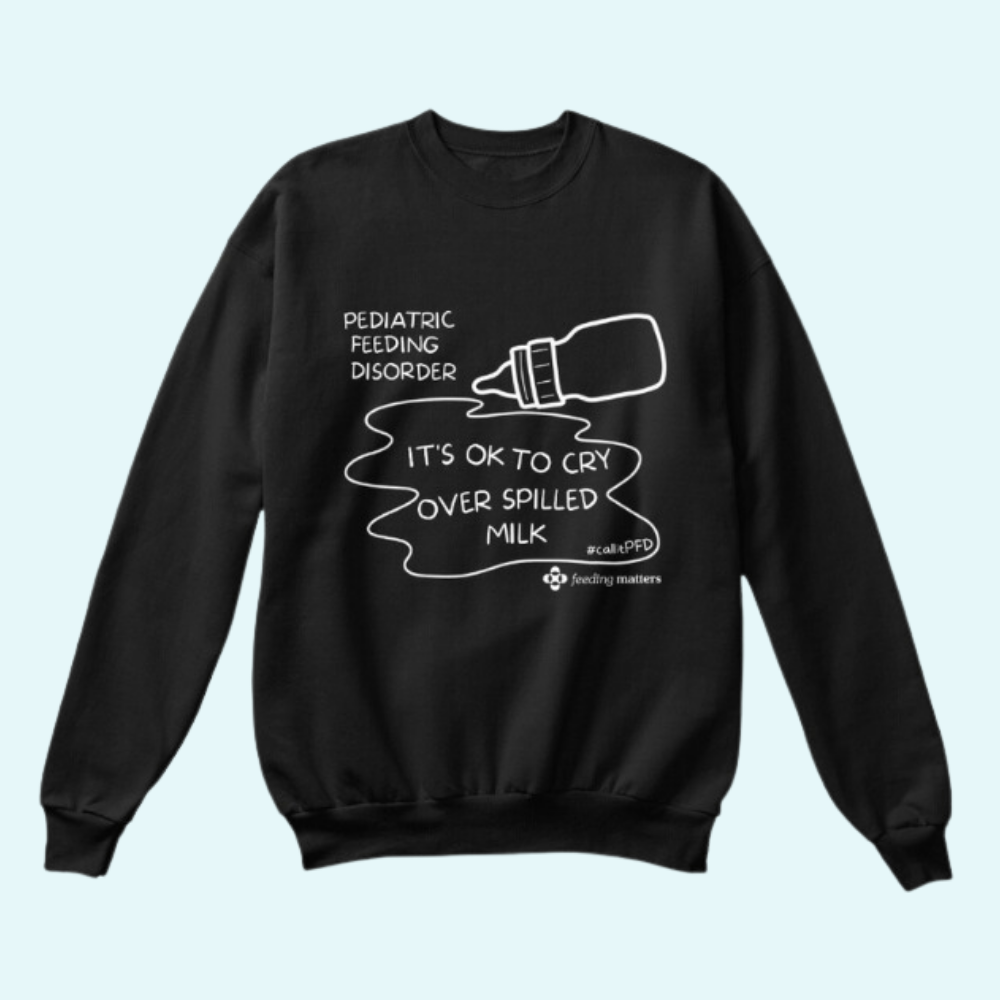
We recently held a contest asking for designs for our PFD Awareness Month merchandise store. We are excited to share our contest winner! This design was created by Madison O’Brien, an Oregon based Speech Pathologist who also has a sibling with a history of a pediatric feeding disorder.
Madison shared her inspiration for the design:
“Parents of children with a Pediatric Feeding Disorder experience high levels of stress and are more likely to develop anxiety and depression than parents of children without feeding difficulties (Rodriguez 2022). So many parents of kids with PFD have expressed to me that they’re barely holding on. I just want them to know they’re not alone and that it’s valid to feel that way.”
Thank you for your design Madison! You can purchase this design, and others, at our merchandise store here.
Reference
https://www.sciencedirect.com/science/article/pii/S2341287922001922
Leadership Spotlight: Paula Rabaey
Published by Feeding Matters on Sep 29, 2021
Feeding Matters Leadership Spotlight is a Q & A series that shares the stories of our leadership volunteers. This month we bring you Paula Rabaey.
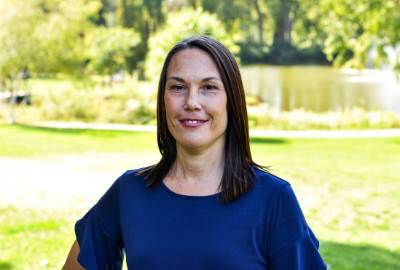 Tell our feeding community a little bit about yourself. Describe your role as an Occupational Therapist and Researcher. What is your approach to research?
Tell our feeding community a little bit about yourself. Describe your role as an Occupational Therapist and Researcher. What is your approach to research?
Hello everyone. My name is Paula Rabaey and I have been an OT for 29 years. The past 14 years of my career have been spent as an Associate Professor in the Department of Occupational Therapy at St. Catherine University located in St. Paul, MN. St. Kate’s is also my alma mater where I earned my undergraduate degree in OT. I have a Ph.D. in occupational therapy from Nova Southeastern University located in Fort Lauderdale, FL, and am 3 classes away from earning my master’s degree in Global Public Health. The majority of my career has been spent in pediatrics and I have worked with multiple age groups across different settings including: outpatient, school, early intervention, home health with medically complex children, and currently in a Level 3 NICU.
In my very first OT position, I was introduced to and mentored in OT’s role and scope of practice in feeding children with cerebral palsy and other neurological developmental delays. Mealtime participation as a major childhood occupation has been my passion ever since. My dissertation explored the meaning of mealtime to African American mothers with young children. This was a qualitative study which utilized photovoice as a means for marginalized mothers to talk about their role of mothering and fostering a healthy mealtime environment.
I also believe research should inform practice, especially in the area of pediatric feeding disorder. We need evidenced based practice models that not only inform assessment and intervention, but also that include family and context. While I love qualitative research methodology, I believe that using a mixed methods approach to research (gathering both objective and subjective information) gives a “bigger picture” view of the complexity of pediatric feeding disorder and the impact on both child and family. I have always approached research as a way to “fill the gaps” in our knowledge. It needs to be well thought out and driven by what is currently in the literature and being done in actual practice. I also believe that factors related to feeding such as food insecurity and food access are a major public health issue impacting the world’s children, particularly since COVID.
You will be working in partnership with Hayley Estrem, PhD, RN, our current Research Pillar Chair as the Chair Elect. What excites you most about this new role?
I love collaborative work! We have well-documented research studies that indicate an interprofessional approach to pediatric feeding disorder is the most effective. I have never worked with children with feeding difficulties just in my own “OT silo”; I learned early on that a team approach was imperative. Much of my learning about pediatric feeding disorder has come from working and problem solving with other professionals. I have to admit, the role of “research pillar chair” sounded daunting, so I was very excited that Feeding Matters created a “chair elect” role as a way to learn and receive mentorship. I am a firm believer in mentoring relationships and I know I can learn so much from working alongside Hayley. Research often includes multiple disciplines or professionals. Research with families and all four domains of PFD represented is key when working with children and families. In my OT career, I have worked alongside nurses, nutritionists and dieticians, speech language pathologists, physicians, and neonatologists to name a few, and partnerships bring about the best outcomes.
The PFD Alliance is comprised of four pillars: research, advocacy, education, and family support. The research pillar seeks to advance research in the field of PFD. Can you tell us about research project that you were particularly proud of?
I have always been concerned about not only how we are assessing children with pediatric feeding disorder, but “what” tools are used to gather information to inform our treatment planning. I can say that most of my knowledge about assessing factors related to feeding difficulties came after OT school and included years of continuing education, mentorship, and self-study. When the new proposed definition of pediatric feeding disorder was published, I was so excited to see how it included all domains! When the research pillar of Feeding Matters announced its small research grant, I jumped on the idea of looking at what current assessment tools feeding therapists used and how they aligned with the four factor areas. Together with my colleague, Dr. Kate Barlow, we designed and carried out a small mixed methods pilot study that looked at this question. We presented our results at the 8th Annual International Pediatric Feeding Disorder Conference this past April and we are presenting this topic at the ASHA conference coming up in November in Washington, DC. We also have a manuscript in the works that we plan to submit to a peer-reviewed journal. It is our hope that we can build on this small study to influence how assessment of pediatric feeding disorder is addressed in Occupational Therapy and Speech Language Pathology programs, and develop a more comprehensive assessment tool for feeding therapists.
We asked several questions about your professional life. Please share something about yourself that we find surprising, or we might not know.
I have been married for 29 ½ years and have 5 grown children, the oldest of which recently got married this past May-to a new OT grad none-the-less! We are “new” empty nesters and our wild purchase was a Vespa that we now use to tool around the countryside! I also love horses and own a Quarab (quarter horse/arab mix) mare named Sunny.
I love to travel and experience new cultures and was introduced to international work around feeding and nutrition for children living without families through SPOON Foundation (Supporting Overseas Orphan Nutrition). I volunteer with this NGO as a feeding technical expert and helped develop an assessment tool that looks at caregiver feeding practices and provides solutions for positioning, cup and spoon use, food textures, and responsive feeding practices for caregivers who feed children with disabilities in orphanages. Last year I received copyright on this feeding assessment tool and hope to do more research on its efficacy and usability. I had the privilege of presenting this work in Russia two years ago. Although COVID has paused this project, I look forward to continuing this work and contributing to the Feeding Matters research agenda as well.
Volunteer Spotlight: Loran Edwards
Published by Feeding Matters on Apr 01, 2021
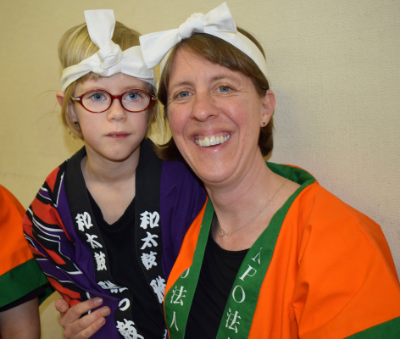 Tell us a little bit about yourself and what you do.
Tell us a little bit about yourself and what you do.
I am an occupational therapy student at the University of Puget Sound in Washington state and I am the mother of a 10 year old with a PFD.
What motivated you to become involved with Feeding Matters?
When my daughter was born premature and needed a feeding tube to eat, I felt very alone and scared. Through the internet, I found other families who knew what I was going through and helped me through the darkest times. A few years later, I found Feeding Matters and knew it was time for me to give back and start helping others as I had been helped.
How have you volunteered with Feeding Matters?
I have been a family coach for about 6 years. I have also worked on several editing projects for Feeding Matters, the latest one being the Family Guide. I am so excited about it and think it is a great resource for families!
What has been your favorite part of volunteering with Feeding Matters?
I have loved connecting with other families and learning from them. It is a wonderful community helping each other to navigate the confusing, often scary, world of PFD.
What sets Feeding Matters apart from other organizations?
I don’t know that other organizations don’t do this, because I am not involved in other organizations, but everyone at Feeding Matters is very easy to reach out to and talk to and they really care about the families they are serving. And EVERYONE understands the challenges that come with PFD! It is wonderful to talk to people without first having to explain what you are experiencing.
VOLUNTEER MEDICAL DIRECTOR: RICHARD NOEL, MD
Published by Feeding Matters on Mar 01, 2021
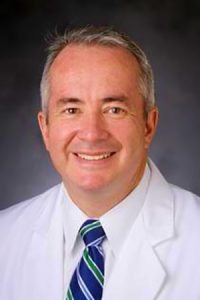
We are excited to share with you our volunteer Medical Director for the 2021-2022 term, Dr. Richard Noel. We also would like to ardently thank Dr. Jaime Phalen, our previous volunteer Medical Director who served in many capacities to advocate for children with PFD over the past few years and remains a close advisor.
Our Medical Director, and all of our PFD Alliance leadership is committed to creating a world in which children with PFD thrive. Additionally, they support Feeding Matters’ philosophy that: we believe families are an equal and valued member of the treatment team and should be respected in this way; we view PFD as a multi-facet challenge comprised of 4 domains; we recognize the need for evidence-based practices; and we believe all sectors are influential and multiple perspectives are necessary to create a functional system of care.
Our CEO, Jaclyn Pederson, recently sat down with Dr. Noel to learn more about his passion for children with PFD.
Tell our feeding community a little bit about yourself. How did you come to practice GI medicine? How did you get involved with Feeding Matters?
As all medical students, I was exposed to all medical and surgical fields and found pediatrics to be the most fun and rewarding. Once in a pediatric training, I found pediatric GI to be the most interesting and decided to pursue additional formal GI fellowship training. It was during this time in Cincinnati that I was initially exposed to pediatric feeding disorder and aerodigestive diseases, both within programs that were the legacy of Dr. Colin Rudolph.
Upon completion of my GI training, I moved to Milwaukee to work with Dr. Rudolph where I learned much more about pediatric feeding disorder from Dr. Rudolph and the active group of interdisciplinary colleagues he organized. I met Shannon Goldwater and Chris Linn and became formally involved with Feeding Matters in 2010, following the initial involvement of Dr. Rudolph and other colleagues with the nascent stages of what grew to be this amazing advocacy organization.
How do you see the PFD consensus definition changing care for our children with PFD?
Feeding problems in children are not new and many have attempted to define them, typically from a perspective that is limited to their own field. Apparently disparate terms like dysphagia, malnutrition, ARFID, infant anorexia, all probably refer to similar things, but are limited by the narrow scope of practice of those who generated them.
The 2019 consensus definition organized by Feeding Matters is the first truly multidisciplinary construct that recognizes the many elements that form pediatric feeding disorder. Furthermore, this consensus definition is written according to the International Classification of Functioning, Disability and Health (ICF), recognizing the disability that can accompany PFD, but has been poorly recognized in considering access to therapies and special accommodations by schools and other settings.
PFD is best managed by an interdisciplinary team where the family is primary. Based on your experience as a gastroenterologist, why do you feel a team-based approach is so important?
The nature of PFD is that relevant issues in a given patient may fall outside the scope of practice in a single discipline (i.e., a gastroenterologist may have expertise in issues relating to the upper GI tract of a child but does not have the same understanding regarding the mechanics of swallowing). It is by this necessity that team-based care is always best, whether in an interdisciplinary team at a large referral center, or a smaller group of specialists who work apart, but form a “virtual team” that can still address all relevant issues of a child with PFD.
What advice would you give the feeding community to help them access or provide optimal care for children with PFD?
Families of children with PFD need to be educated consumers who can push their providers to ensure all relevant needs are met. Do we need a referral to a psychologist? Do we need to enroll a dietitian who can help a feeding therapist broaden the choices of food with a given texture? Sometimes, it takes an educated family to push a provider to become better at managing a complex problem, such as PFD.
We have asked several questions about your connection to PFD. Please share something about yourself that we may find surprising, or we might not know.
I was born in Mexico City and Spanish was my first language. We moved to San Antonio, TX when I was 9 years old, and I always benefited from my family’s bicultural perspective on issues.
Volunteer Spotlight: Elina Zimmerman
Published by Feeding Matters on
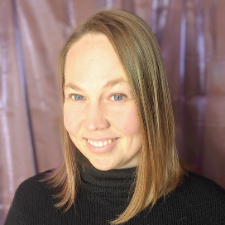 Tell us a little bit about yourself and what you do.
Tell us a little bit about yourself and what you do.
I’m a CF-SLP at a special education preschool in the San Francisco Bay Area. After over a decade as a Montessori teacher and then a wilderness survival instructor, I decided to pivot my career and pursue a Master’s in Speech Language Pathology, which I completed in December 2020. I live in Oakland, CA with my partner and 2 Huskies.
What motivated you to become involved with Feeding Matters?
During my studies, I developed a passion for pediatric feeding and swallowing disorders. Since graduate programs typically offer very little information on PFD, becoming involved with Feeding Matters was one of the ways I could broaden my knowledge.
How have you volunteered with Feeding Matters?
My primary volunteer responsibilities include managing event, provider, and resource submissions on the FM website.
What has been your favorite part of volunteering with Feeding Matters?
I loved attending the Annual Community Event virtually this year – it was energizing and inspiring!
What sets Feeding Matters apart from other organizations?
The way FM connects families to one another for support is invaluable. Also, their commitment to research is helping to create a broader evidence base for clinicians who assess and treat PFD.
Volunteer Spotlight: PFD Awareness Month Volunteers
Published by Feeding Matters on Jan 01, 2021
Feeding Matters Volunteer Spotlight is a monthly Q & A series that shares the stories of our growing network of change agents, the driving force behind our vision to create a world where children with pediatric feeding disorder will thrive. This month we bring you our PFD Awareness Month volunteers.
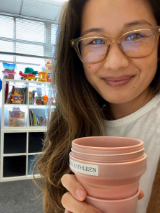 Kathleen Dung
Kathleen Dung
Tell us a little bit about yourself and what you do.
Hi, I’m Kathleen! I’m from Los Angeles and am a pediatric SLP serving the Early Intervention population. My passion is serving those with pediatric feeding and swallowing disorders.
What motivated you to become involved with Feeding Matters?
Initially, I became an ambassador with Feeding Matters to be a more active member in the PFD community. I wanted to inspire and give hope to those affected by feeding disorders. I also wanted to shed light on it through advocacy for not only families but other professionals.
How have you volunteered with Feeding Matters?
Previously, I participated in the International Pediatric Feeding Disorder Conference. Most recently, I wrote and submitted proclamations to declare December as PFD Awareness Month in 5 states!
What has been your favorite part of volunteering with Feeding Matters?
My favorite aspect of volunteering with Feeding Matters has been submerging myself within the network to amplify the voices of individuals affected by pediatric feeding disorders and forge a vibrant community through education and advocacy.
What sets Feeding Matters apart from other organizations?
I really love how passionate and welcoming everyone involved is. I also believe the amount of information for professionals and families is so extensive and helpful to all!

Johanna Stadtmauer
Tell us a little bit about yourself and what you do.
I recently became certified as a speech-language pathologist (SLP) and this is my second year working in the New York City public school system. My students are in Pre-K through second grade and they present with a variety of special needs, such as autism, Down Syndrome and other developmental delays. I have always loved working with little ones – before becoming an SLP, I worked as an early childhood assistant teacher and Hebrew language tutor. My native languages are English, Hebrew, and French. I love to travel, cook new recipes, listen to music, and dance!
What motivated you to become involved with Feeding Matters?
The power of social media! I found out about Feeding Matters through a speech-language pathologist who specializes in pediatric feeding disorders. I became more interested in this area while I was in graduate school once I took a course on dysphagia and an elective titled “Speech and Swallowing for the Medically Complex Child.” I loved the mission behind Feeding Matters and wanted to be a part of a greater community that is aiming to make feeding a more pleasurable and less stressful experience for children and their families.
How have you volunteered with Feeding Matters?
My most recent volunteer project was applying for state proclamations to declare December as “Pediatric Feeding Awareness Month.” As some may call this “behind the scenes” work, I was amazed to see how much awareness was spread this month through healthcare professionals in the field, families recalling their experiences, and the organization itself sharing PFD myths and facts. Even in my own experience as a new first time mother, I see how there is little knowledge on PFD amongst my other mom friends. It is easy to feel alone when dealing with a child who is struggling with feeding and so, being part of a team that provides that support and awareness on a global scale is really meaningful to me.
What has been your favorite part of volunteering with Feeding Matters?
Feeding Matters not only provides support to families, but there are also many resources available to healthcare professionals, such as their virtual conference. I love that I am learning for myself and my profession as well.
What sets Feeding Matters apart from other organizations?
Feeding Matters is the first organization to do what it is doing for children with feeding disorders. From working to get PFD its own ICD-code for diagnosis and billing purposes to getting families the right support with their resourceful programs, they are changing the field for pediatric feeding disorders.
Volunteer Spotlight: November
Published by Feeding Matters on Nov 09, 2020
 In this season of thanksgiving, we would like to express our gratitude to each and every one of our volunteers who truly help us further our mission. Their work on diverse projects help to create a world in which children with pediatric feeding disorder thrive. They include 50 coaches who supported 105 families around the US and internationally and 368 members of our PFD Alliance who continue to move our work forward in our four pillars: Education, Advocacy, Research, and Family Support.
In addition, this year our volunteers:
In this season of thanksgiving, we would like to express our gratitude to each and every one of our volunteers who truly help us further our mission. Their work on diverse projects help to create a world in which children with pediatric feeding disorder thrive. They include 50 coaches who supported 105 families around the US and internationally and 368 members of our PFD Alliance who continue to move our work forward in our four pillars: Education, Advocacy, Research, and Family Support.
In addition, this year our volunteers:
- Submitted applications to more than 10 states to have a PFD awareness month this December 2020.
- Created evidence bites for our newsletters.
- Worked to create infographics that visualize our most recent accomplishments.
- Created a guide for families who are new to their journey with PFD.
- Contributed to our #TheNextRightThing campaign.
- Developed the 2021 International Pediatric Feeding Disorder education program.
- Provided PFD and Feeding Matters outreach around the country.
- Supported our 2020 International Pediatric Feeding Disorder Conference.
- Supported our November virtual event.
From all of us at Feeding Matters, a heart-felt thank you to our amazing volunteers!
Volunteer Spotlight: Tina Vargas
Published by Feeding Matters on Aug 07, 2020
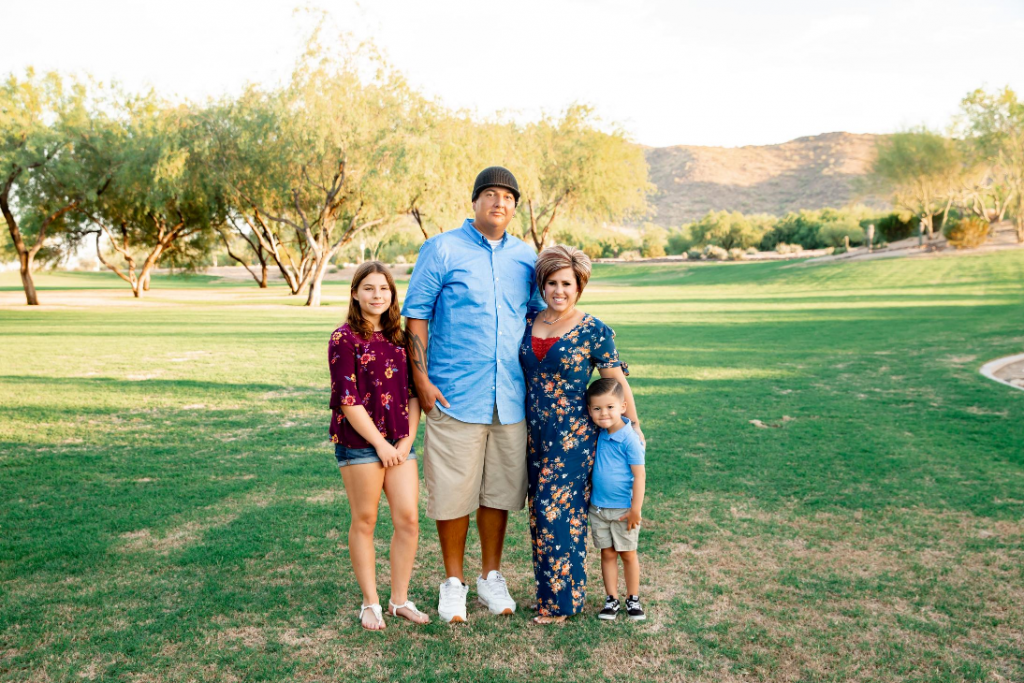 Feeding Matters Volunteer Spotlight is a monthly Q & A series that shares the stories of our growing network of change agents, the driving force behind our vision to create a world where children with pediatric feeding disorder will thrive. This month we bring you Tina Vargas.
Feeding Matters Volunteer Spotlight is a monthly Q & A series that shares the stories of our growing network of change agents, the driving force behind our vision to create a world where children with pediatric feeding disorder will thrive. This month we bring you Tina Vargas.
Tell us a little bit about yourself and what you do.
I am a mom of two amazing kids, married to my best friend for six years, and I have worked in the medical field for twenty years!
What motivated you to become involved with Feeding Matters?
I started reading about dysphagia when my son was diagnosed. I did not realize that there was such a big community out there of not only children, but also adults dealing with this issue. Once we went through feeding therapy, using thickeners and having surgery, I just felt that I wanted to be able to do anything I can to help others. So reaching out, answering questions, or just simply being there for someone means something to me.
How have you volunteered with Feeding Matters?
I have been a Power of Two supporter, mentoring families who have similar issues with one of their children like my son had. Talking with them in time of need, answering questions, or simply just to see how they are doing. Being able to go to events and represent Feeding Matters has been amazing. Meeting families and helping in any way I can has been healing.
What has been your favorite part of volunteering with Feeding Matters?
My favorite part of volunteering is after working with parents for a couple months, listening to everything they have gone through and coming up with other ideas to help, that finally they make a breakthrough. In the beginning of our conversations, moms and dads are feeling helpless and don’t know what to do. When they get to the correct physician and their child eats, even just one new food, without coughing – that is the best. You feel like together you have made a huge step in getting these amazing families closer to an answer. To hear how happy they are when they can have a simple meal together without an issue is just the best part.
What sets Feeding Matters apart from other organizations? Feeding Matters is like a family. From the day I reached out for information and a simple list of doctors, they have always made sure to not only check on us as a family, but me personally. They know my story, my family, and always check in to see if we need anything. With every family we talk about, they have such deep concern and truly want to lead and help each and every one.
Volunteer Spotlight: Memorie Gosa
Published by Feeding Matters on Jul 01, 2020
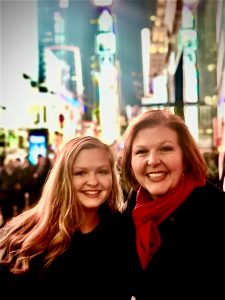 Feeding Matters Volunteer Spotlight is a monthly Q & A series that shares the stories of our growing network of change agents, the driving force behind our vision to create a world where children with pediatric feeding disorder will thrive. This month we bring you Memorie Gosa.
Feeding Matters Volunteer Spotlight is a monthly Q & A series that shares the stories of our growing network of change agents, the driving force behind our vision to create a world where children with pediatric feeding disorder will thrive. This month we bring you Memorie Gosa.
Tell us a little bit about yourself and what you do. I am an associate professor and pediatric speech-language pathologist at The University of Alabama.
What motivated you to become involved with Feeding Matters? I appreciate the parent support that is provided by Feeding Matters. I refer the families I work with to this organization all the time. I volunteered so that I could also help advance the agenda of Feeding Matters to assist families and children that live with pediatric feeding disorders.
How have you volunteered with Feeding Matters? I have worked to connect Feeding Matters with other organizations that I am involved with, such as ASHA, DRS, and ABSSD.
What has been your favorite part of volunteering with Feeding Matters? I enjoy the opportunity to work with others and learn from other professionals and families that are involved with this organization.
What sets Feeding Matters apart from other organizations? The parent to parent support is what sets Feeding Matters apart from other organizations.
Volunteer Spotlight: LACI Cohort
Published by Feeding Matters on Jun 10, 2020
- BHHS Legacy Foundation for their generous grant and relentless drive to strengthen communities’ health and quality of life through the empowerment of local change agents.
- Brandt Perry, Feeding Matters’ LACI Parent Advocate, who served as a parent representative to ensure our families’ voices were heard.
- Our LACI members, selected based on specific qualifications and professional standing, who successfully completed the cohort and have paved the way for future initiatives:
Occupational Therapists Speech Language Pathologists Hannah Brennan Dena Berg Laura Comfort Amy Gabel Hana Eichele Angela Hughes Susan Hodges Marnie Madden Lisa Olsen Stephanie Sanchez Jennifer Urich Jacqueline Tschupp